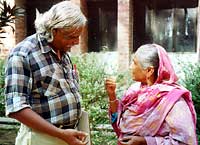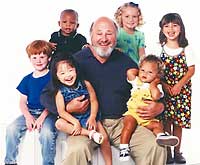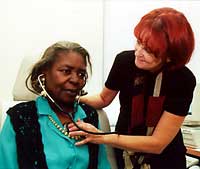|

|

|
NEWS SEARCH
|
|
|
|

|
UC
Berkeley celebrates 2002 public health heroes at 6th annual awards reception
13
March 2002
By Sarah Yang, Media
Relations
Berkeley
- From rural villagers who receive health care in Bangladesh to U.S.
residents who now seek medical care in desegregated hospitals, millions
of people have benefited from the contributions made by the 2002 Public
Health Heroes being honored by the University of California, Berkeley,
School of Public Health.
The Public Health
Heroes award will be presented Friday (March 15) at an Oakland celebration.
Established in 1996, the annual awards recognize individuals and organizations
for their outstanding achievements in the advancement of public health
and health care.
The heroes to be
honored this year are:
| |

Dr. Zafrullah Chowdhurry speaks with village area's traditional birth
attendant.
photo, courtesy Zafrullah Chowdhurry

President and Mrs. Clinton with Dr. Philip Lee during his tenure
assistant secretary of health and human services (1994-1997).
photo, courtesy The White House

Rob
Reiner is a nationally recognized advocate for early childhood development
programs
photo, courtesy I Am Your Child Foundation

A patient at On Lok receives a regular checkup from Dr. Terrie Mendelson.
On Lok has been providing quality, affordable health care services
to the elderly since 1971.
photo, courtesy of On Lok
|
Zafrullah Chowdhury,
for bringing health care to the underserved rural population in Bangladesh.
Using his experience from setting up the first field hospital for freedom
fighters and refugees in the War of Liberation for Bangladesh, Chowdhury
founded the non-governmental organization Gonoshasthaya Kendra, or the
People's Health Center, in 1972 to provide primary health care services
for rural communities. The organization has since expanded to include
agricultural cooperatives, women's vocational training centers and family
planning services.
Philip R. Lee, MD,
for his role in affecting U.S. health policy. In the 1960s, Lee served
as director of Health Services in the state department's Agency for
International Development, and then as deputy assistant secretary to
the Department of Health, Education and Welfare. Lee stood out in his
position as one of the few physicians who supported Medicare. He also
worked to apply the Civil Rights Act to desegregate hospitals and helped
establish the National Center for Health Services Research. After spending
24 years at UCSF, he went back to Washington, D.C., in 1993 to serve
a four-year term in the Clinton Administration as assistant secretary
for Health and Human Services.
Rob Reiner, for
shining the spotlight on a child's early developmental years. Reiner,
a successful movie director and actor, co-founded the I Am Your Child
Foundation. In 1998, he led the effort to pass Proposition 10 in California,
the innovative initiative that levied a 50-cent tax on cigarettes to
fund early childhood development programs for the state's youngest children.
Reiner chairs the California Children and Families Commission, which
oversees the Proposition 10 funds, and co-chairs the Governor's Task
Force on School Readiness with Education Secretary Kerri Mazzoni.
On Lok, a San Francisco-based
non-profit organization established in 1971, for providing the elderly
with quality, affordable care services. The organization, which means
"place of peace and happiness" in Cantonese, was one of the country's
first day health centers for the elderly and provides an alternative
to nursing homes. On Lok's success served as a model for the Program
of All-inclusive Care for the Elderly (PACE), a Medicare program signed
into law in 1997 to make it available in all 50 states. Since then,
more than 60 organizations in 27 states are in different stages of replicating
the On Lok model through the PACE program.
The Public Health Heroes are chosen by members of the School of Public
Health's Advisory Council, a group made up of community, industry and
faculty leaders. The panel selects three individuals and one organization
to honor each year from a list of nominees provided by School of Public
Health faculty, panel members and previous award recipients.
"It is a privilege to be adding this year's four honorees to the school's
very distinguished list of Public Health Heroes," said Edward E. Penhoet,
dean of the School of Public Health. He added that, similar to all awardees
selected since 1996, this year's group was exemplified not only for
its efforts to improve the health of the human population, but also
for the diversity of their activities in achieving this goal.
The awards serve to highlight the increasingly complex challenges
- from antibiotic resistance to the threat of bioterrorism to an aging
baby boomer population - faced by public health workers today. At the
same time, many parts of the world are still struggling to get access
to basic health necessities, such as clean water, nutritious food and
vaccinations.
The UC Berkeley School of Public Health is poised to help lead the
efforts to tackle these challenges through the Health Sciences Initiative,
an innovative multi-disciplinary program that cultivates research advances
that benefit human health.
###
|

|